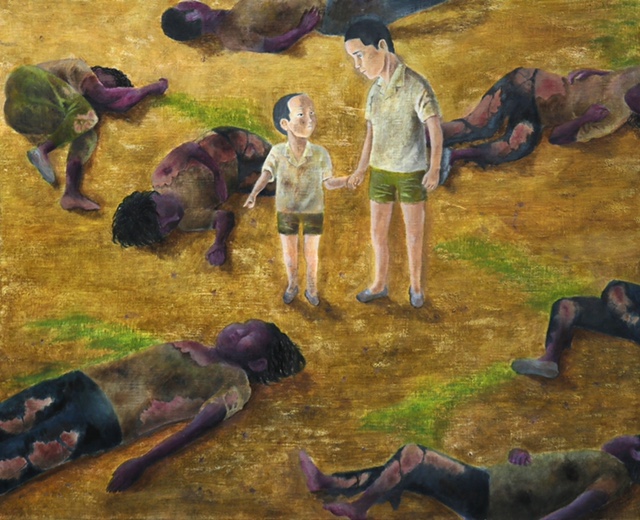Keisaburo Toyonaga
My Life Dedicated to A-bomb Survivors Overseas
4. After August 7th
The next morning, my grandfather, my cousin in junior high school who lived nearby, and I pulled a large two-wheel cart over the Funakoshi Pass and through Fuchu-cho toward Hiroshima City in search of my mother and Hiroyuki. On the way, coming from the direction of Hiroshima City, people with blackened faces, their clothes torn to shreds, and their hands raised in front of their chests slowly passed by, just like the people I had seen at Saka Station. I think I saw hundreds of them. It resembled a procession, with people spread out across the street, walking with unsteady steps. We left early in the morning, so many of them must have walked all through the night. At first, I was scared to death to see them, but with time, that feeling of fear disappeared.
After walking for about an hour and a half, we finally arrived at our house in Onaga-cho. However, the house had burned down and there was nothing left. No matter how much we searched, there were no dead bodies. We heard that people in Onaga-cho had gone to Showa-machi to demolish buildings. We managed to get as far as Danbara, but from there, there were only black burned fields, and we could not go any further. We had no choice but to return to Funakoshi that day.
The next day, on the 8th, the three of us went to Onaga-cho again. The East Military Drill Grounds was near my house, so we checked each person who was lying there. We couldn’t find my mother or Hiroyuki, but near the East Military Drill Grounds was a dead horse. Eventually, we returned to Funakoshi that day.
On the 9th, we went back to the Onaga-cho area. A person we happened to meet told us that people who were in this area had been taken to the empty space in front of the crematorium on Futabayama Hill. So, we went to Futabayama Hill and found dozens of burned and injured people laid on the ground in rows. We looked at each person’s face, but they all had burns all over their faces, and we could not identify anyone. My grandfather started calling out my mother’s name in a loud voice, “Tsuyako! Tsuyako!” Then, in the distance, we heard Hiroyuki calling out, “Grandpa!” When we approached him, there were rows of injured people who all looked the same, all blackened. We couldn’t even tell if they were men or women. When my grandfather asked, “Which one is your mother?” Hiroyuki said, “This one! This is my mother!” pointing to a person lying on the ground. Her face was blackened and swollen and her clothes were burned and tattered. If it hadn’t been for Hiroyuki, I never would have considered this person to be my mother.

My mother told us she had not felt alive until we had found her, because every day, she heard voices around her saying, “XX people died today.” If my grandfather had not called out my mother’s name right then and there, if Hiroyuki had not recognized my grandfather’s voice, what would have happened to her and Hiroyuki? He never left her side from the 6th to the 9th. If she had died, he might have lived as an A-bomb orphan. It was truly a miracle that we were able to find each other. I was so happy that my mother and brother were alive.
We took my mother and Hiroyuki in the large two-wheeled cart back to our house in Funakoshi, where my mother’s sisters lived, and they cared for my injured mother. My mother had burns on her face and arms that were extremely painful, but at the time there was not even medicine to put on them. We grated cucumbers or potatoes and applied the paste over the burns. I think that was still better than doing nothing. Cucumbers and potatoes were very precious at that time, and my mother’s sisters seldom ate them, but they gave these vegetables to us.
Hiroyuki who ended up underneath my mother was not injured or burned. However, the night we arrived at my grandfather’s house, his diarrhea began. He hadn’t eaten anything of substance, but his diarrhea continued for almost ten days. He gradually became weak in his legs, his eyes goggled around, and he grew weaker and weaker to the point that I thought he might die. At that time, we knew nothing about acute radiation sickness.
Since the town of Funakoshi was close to Hiroshima, many victims had evacuated there, and we heard painful moaning from all over saying, “I’m in pain! I’m in pain!” But there was no medicine anywhere to give them or ointment to put on them, and those who were seriously ill died one after another. Fortunately, my mother and Hiroyuki had relatives living in the area who brought them food, even though they barely had any for themselves, and though it took many months, both of them gradually regained their health.